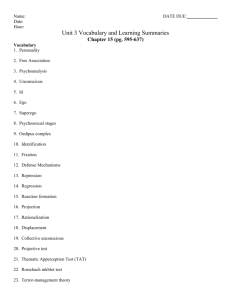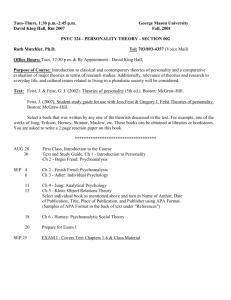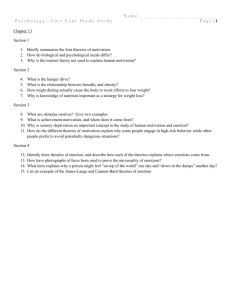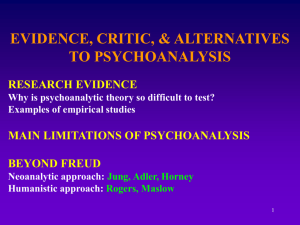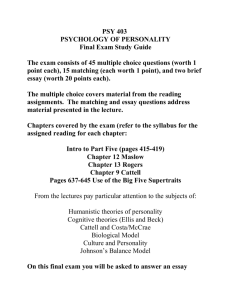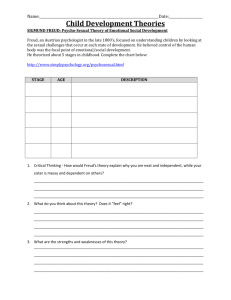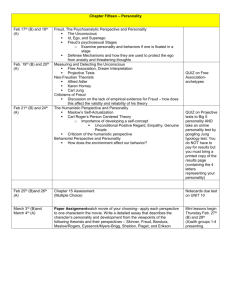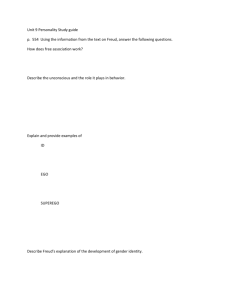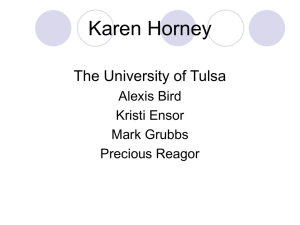ÇAĞ UNIVERSITY
advertisement
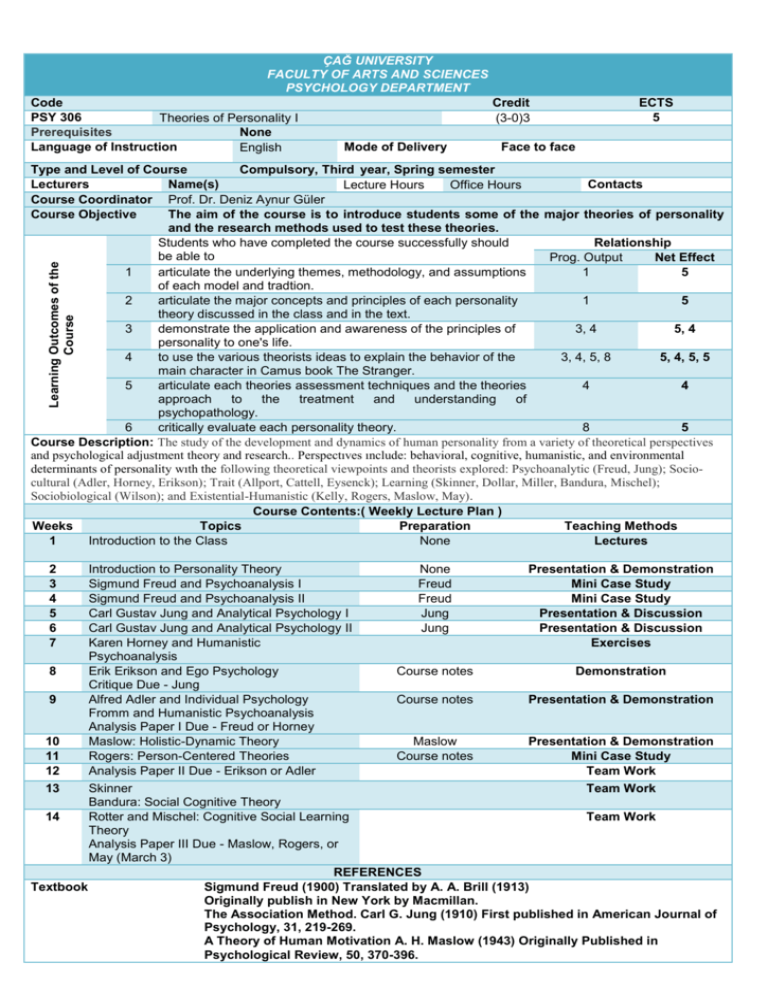
ÇAĞ UNIVERSITY FACULTY OF ARTS AND SCIENCES PSYCHOLOGY DEPARTMENT Code PSY 306 Theories of Personality I Prerequisites None Language of Instruction English Credit (3-0)3 Mode of Delivery ECTS 5 Face to face Learning Outcomes of the Course Type and Level of Course Compulsory, Third year, Spring semester Lecturers Name(s) Contacts Lecture Hours Office Hours Course Coordinator Prof. Dr. Deniz Aynur Güler Course Objective The aim of the course is to introduce students some of the major theories of personality and the research methods used to test these theories. Relationship Students who have completed the course successfully should be able to Net Effect Prog. Output 5 1 articulate the underlying themes, methodology, and assumptions 1 of each model and tradtion. 5 2 articulate the major concepts and principles of each personality 1 theory discussed in the class and in the text. 5, 4 3 demonstrate the application and awareness of the principles of 3, 4 personality to one's life. 5, 4, 5, 5 4 to use the various theorists ideas to explain the behavior of the 3, 4, 5, 8 main character in Camus book The Stranger. 4 5 articulate each theories assessment techniques and the theories 4 approach to the treatment and understanding of psychopathology. 5 6 critically evaluate each personality theory. 8 Course Description: The study of the development and dynamics of human personality from a variety of theoretical perspectives and psychological adjustment theory and research.. Perspectıves ınclude: behavioral, cognitive, humanistic, and environmental determinants of personality wıth the following theoretical viewpoints and theorists explored: Psychoanalytic (Freud, Jung); Sociocultural (Adler, Horney, Erikson); Trait (Allport, Cattell, Eysenck); Learning (Skinner, Dollar, Miller, Bandura, Mischel); Sociobiological (Wilson); and Existential-Humanistic (Kelly, Rogers, Maslow, May). Course Contents:( Weekly Lecture Plan ) Weeks Topics Preparation Teaching Methods 1 Lectures Introduction to the Class None 2 3 4 5 6 7 Presentation & Demonstration Introduction to Personality Theory None Mini Case Study Sigmund Freud and Psychoanalysis I Freud Mini Case Study Sigmund Freud and Psychoanalysis II Freud Presentation & Discussion Carl Gustav Jung and Analytical Psychology I Jung Presentation & Discussion Carl Gustav Jung and Analytical Psychology II Jung Exercises Karen Horney and Humanistic Psychoanalysis 8 Demonstration Erik Erikson and Ego Psychology Course notes Critique Due - Jung 9 Presentation & Demonstration Alfred Adler and Individual Psychology Course notes Fromm and Humanistic Psychoanalysis Analysis Paper I Due - Freud or Horney 10 Presentation & Demonstration Maslow: Holistic-Dynamic Theory Maslow 11 Mini Case Study Rogers: Person-Centered Theories Course notes 12 Team Work Analysis Paper II Due - Erikson or Adler 13 Team Work Skinner Bandura: Social Cognitive Theory 14 Team Work Rotter and Mischel: Cognitive Social Learning Theory Analysis Paper III Due - Maslow, Rogers, or May (March 3) REFERENCES Textbook Sigmund Freud (1900) Translated by A. A. Brill (1913) Originally publish in New York by Macmillan. The Association Method. Carl G. Jung (1910) First published in American Journal of Psychology, 31, 219-269. A Theory of Human Motivation A. H. Maslow (1943) Originally Published in Psychological Review, 50, 370-396. Related links Course Notes Recommended Reading Material Sharing Activities Midterm Exam Quizzes Homework Effect of The Activities Effect of The Final Exam Contents Hours in Classroom Hours out Classroom Homeworks Implementation Quizzes Midterm Exam Fieldwork Final Exam http://www.bps.org.uk/ Bekirogullari Z.; Theories of Personality British Psychological Magazine Monthly / Jung's General description of the types. Number 1 4 4 ASSESSMENT METHODS Effect 30% 5% 5% 40% 60% ECTS TABLE Number 14 14 1 4 4 1 1 1 Notes Hours 3 3 4 3 1 10 12 18 Total Total / 30 ECTS Credit RECENT PERFORMANCE Total 42 42 4 12 4 10 12 18 144 =144/30=4,80 5
